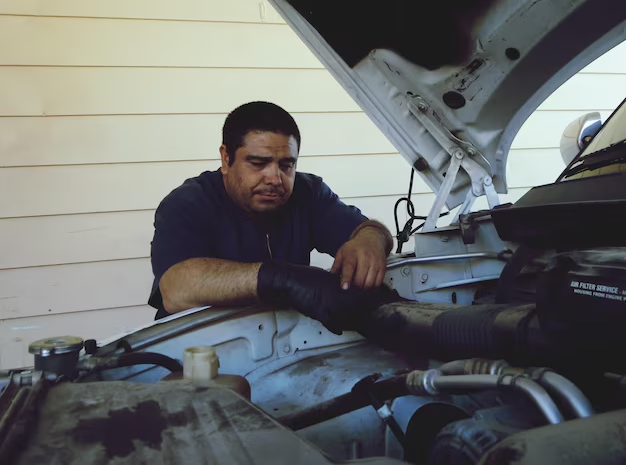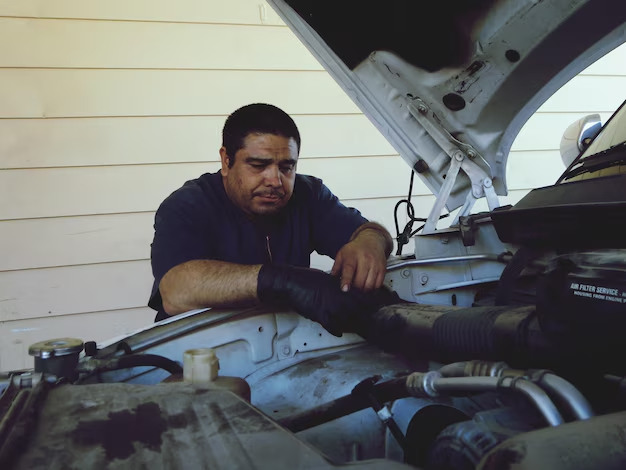
How Often Should You Change Your Oil? A Guide for Indiana Drivers
If there’s one piece of routine maintenance that keeps your car running smoothly for years to come, it’s the oil change. Despite being one of the most common and affordable services for your vehicle, many drivers in Indiana aren’t quite sure how often they should be getting it done—or why it really matters.
Whether you’re commuting across Seymour, IN or driving long distances through rural stretches of the Hoosier State, keeping up with oil changes is one of the smartest ways to protect your engine. This guide will break down exactly what oil changes do, why timing matters, and how Indiana’s driving conditions can impact your maintenance schedule.

What Does an Oil Change Really Do?
Your engine relies on clean oil to function properly. Oil lubricates the moving parts inside the engine, helping to reduce friction and dissipate heat. Over time, that oil breaks down and gets contaminated with dirt, dust, and engine debris. When that happens, it can no longer do its job effectively.
Skipping oil changes—or putting them off too long—can result in:
- Increased engine wear
- Overheating
- Sludge buildup
- Reduced fuel efficiency
- Complete engine failure in severe cases
An oil change removes the dirty, degraded oil from your engine and replaces it with fresh oil and a new filter, which helps keep everything clean, cool, and well-lubricated.
How Often Should Indiana Drivers Change Their Oil?
This is where things get a little more specific. The old advice of changing your oil every 3,000 miles isn’t necessarily wrong, but it’s outdated. With modern synthetic oils and more efficient engines, many vehicles can go much longer between changes.
Here’s a general guide to help you determine how often you should change your oil in Indiana:
1. Every 5,000 to 7,500 Miles (Synthetic Blend or Conventional Oil)
This range suits most cars that use standard or synthetic blend motor oils and are driven under “normal” conditions—meaning moderate speeds, highway driving, and light loads.
2. Every 7,500 to 10,000 Miles (Full Synthetic Oil)
If your vehicle uses full synthetic oil, you may be able to go closer to 10,000 miles between oil changes. Check your owner’s manual, as some newer engines are designed for extended intervals.
3. Every 3,000 Miles (Severe Driving Conditions)
If your driving falls into the “severe” category, you may need oil changes more frequently. Severe conditions include:
- Frequent short trips (under 5 miles)
- Stop-and-go traffic
- Idling for extended periods
- Towing or hauling heavy loads
- Driving in dusty, muddy, or salty conditions
- Long stretches of highway driving in extreme temperatures (cold winters or hot summers)
In Indiana, fluctuating weather and road salt in winter often put drivers in this category, especially in rural areas around Seymour.
What the Manufacturer Recommends
Your vehicle’s manufacturer offers the most accurate recommendation for how often to change your oil. You’ll find this information in your owner’s manual or maintenance booklet. It usually includes:
- Recommended oil type (conventional, synthetic blend, full synthetic)
- Oil change interval (mileage and/or time-based)
- Special instructions based on driving conditions
At Schimpf’s Garage in Somerdale, we help drivers stick to their maintenance schedule by offering personalized service reminders and expert guidance for all makes and models, including commercial vehicles and fleets.
Signs You’re Overdue for an Oil Change
Even if you haven’t reached your mileage limit, your engine might be telling you it’s time for a change. Keep an eye out for:
- Dark or dirty oil on the dipstick
- Burning oil smell inside the cabin
- Knocking or ticking noises from the engine
- Oil warning light or check engine light
- Sluggish performance or rough idling
If you notice any of these symptoms, don’t wait—bring your vehicle in for a routine maintenance check. Ignoring these signs can lead to expensive repairs down the road.
How Weather and Driving Conditions in Indiana Affect Oil Life
Indiana drivers face a range of weather, from hot, humid summers to icy, slushy winters. These changing conditions can take a toll on your vehicle and affect how often you need an oil change.
Cold Starts in Winter: In freezing temps, oil thickens and takes longer to circulate. That extra strain can accelerate wear, especially on short trips where the engine doesn’t fully warm up.
Hot Summers and Road Trips: High heat can break down oil faster, especially during long drives or heavy hauling. If you’re hitting the road in summer or towing with a truck, consider changing your oil a bit earlier than usual.
Dust and Road Salt: Dusty rural roads in the summer and salt-covered highways in the winter can lead to more contaminants entering your engine. This makes clean oil—and regular changes—even more critical.
At Schimpf’s Garage, we always factor in local weather and your driving habits when recommending oil change intervals.
Conventional vs. Synthetic Oil: What’s the Difference?
Choosing the right oil type also affects how often you need to change it. Here’s a quick comparison:
Oil Type | Typical Change Interval | Best For |
Conventional Oil | 3,000–5,000 miles | Older vehicles, lighter use |
Synthetic Blend | 5,000–7,500 miles | Budget-friendly upgrade, moderate performance |
Full Synthetic | 7,500–10,000 miles | High-performance engines, extreme conditions |
Synthetic oils cost more upfront but last longer and perform better in Indiana’s fluctuating weather. They also resist breakdown better under stress—ideal for commercial trucks and fleet vehicles.
Should Commercial Vehicle Owners Follow a Different Schedule?
Absolutely. If you own or operate a semi, box truck, or dump truck in Indiana, your oil change interval should be based on engine hours as well as mileage. These workhorses operate under high loads and extreme conditions, which means their maintenance needs are more frequent and critical.
Schimpf’s Garage offers tailored oil change schedules and mobile repair services for commercial fleets, so your vehicles stay road-ready without wasting time in the shop.
Why Routine Maintenance Matters More Than Ever
Oil changes are the foundation of good car care. But they’re also a great opportunity to catch small issues before they turn into big ones. During a routine oil change, our mechanics at Schimpf’s Garage will inspect key components of your vehicle, including:
- Belts and hoses
- Fluid levels
- Brake condition
- Air and cabin filters
- Battery health
That’s why we offer free battery, brake, and A/C checks with any repair, available through August 31, 2025. When you bring your vehicle in for an oil change, you’re doing more than protecting your engine—you’re taking proactive steps toward safer, more reliable driving.
If you’re in Seymour, IN, or the surrounding areas and can’t remember the last time you had an oil change, don’t wait. Let the experienced technicians at Schimpf’s Garage take a look under the hood. We’ll recommend the right oil, the right interval, and perform every service with expert care and clear communication, whether you drive a compact sedan or a commercial fleet. Book your next oil change today.


